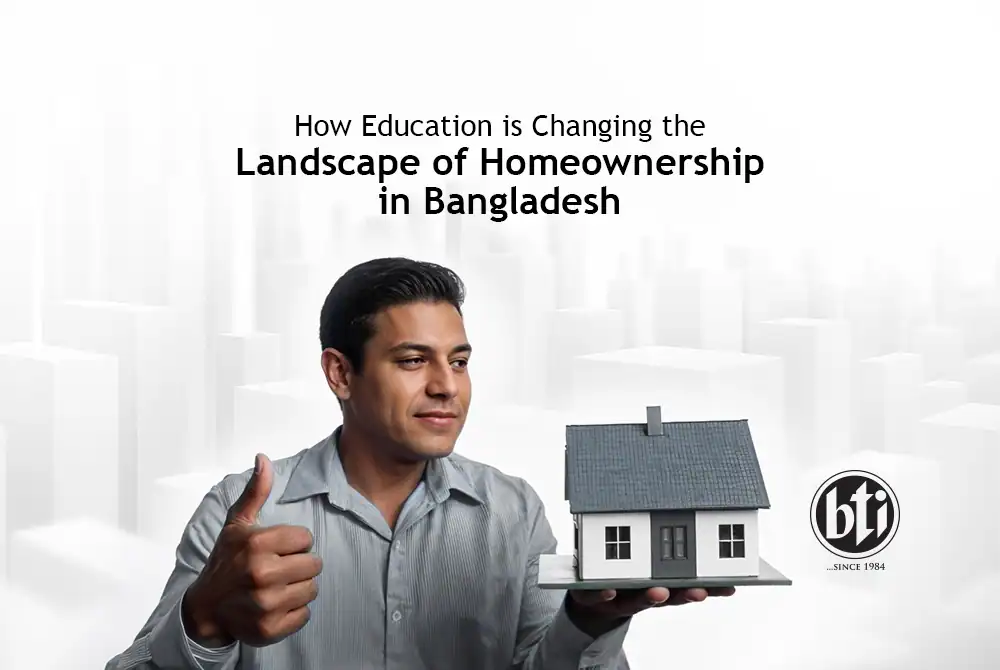
Bangladesh has been going through some pretty big changes in recent years. These changes have encompassed everything from classrooms to everything else under the sun. While education has always been viewed as a necessity for personal and social growth, it is now transforming and reshaping one of the most significant life goals for many Bangladeshis, i.e. homeownership.
Historically, in the Indian subcontinent, especially in Bangladesh, homeownership has been viewed as a symbol of stability, social status, and financial security. For decades, owning a house in an urban metropolis like Dhaka and Chattogram, was considered to be the privilege that was only afforded to the selected few, such as wealthy families, bureaucrats, and established businessmen. Limited financial literacy, poor or no access to banking services, and generational dependence on inheritance also meant that a large portion of the population either rented homes, or remained in ancestral homes passed down from generation to generation.
Things, however, are slowly beginning to change–a major reason behind this transformation being education.
1. Education & Economic Mobility
Increased rate of literacy and greater access to higher education in Bangladesh in the last two decades has led to better employment opportunities, both within Bangladesh and abroad. With more and more graduates entering sectors such as information technology, ICT, telecommunications, banking, education, and even freelancing, a new middle class is slowly beginning to emerge.
Educated professionals are earning more and beginning to think differently. They are saving, investing, and planning long-term goals ahead of time — with homeownership becoming a realistic goal that many now desire to achieve.
2. Financial Literacy and Smart Decision-Making
A major benefit of the population moving towards higher education is the financial literacy that comes along with it. When people get access to formal education, they also gain the power to make decisions that make them financially independent. They also begin to understand loans, interest rates, mortgages, and investment opportunities.
This shift is significant in Bangladesh, where banks and non-bank financial institutions (NBFIs) are offering more home loan products that are specifically tailored for salaried individuals. Educated Bangladeshis are slowly gaining more confidence in taking calculated financial steps toward purchasing property, both new and secondary.
3. Changing Mindsets: Rent vs. Own
As people begin to get more educated, the mindset around renting versus owning is also slowly transforming. The younger generation now sees homeownership as something that need not wait for a later age. Rather, many younger employed people are looking to acquire property much earlier, perhaps even before marriage. Education is significant here as well, since exposure to global trends through study, media & even digital platforms is encouraging young professionals to prioritize real estate investment in order to build wealth in the future.
4. The Role of Female Education and Empowerment
They say that an educated woman can educate the entire nation. Nothing is truer for communities across Bangladesh where more women are getting educated now than before. As female participation in higher education and the workforce keeps growing, their financial independence grows simultaneously. Educated women are now co-owning property, taking out home loans, and also making financial decisions alongside or even independent of their male counterparts. This shows how there is now a profound cultural shift in gender roles and financial empowerment occurring across Bangladesh.
 5. The Rise of Educated Communities & Urban Planning
5. The Rise of Educated Communities & Urban Planning
As more people become educated, so does the demand for better living standards. Educated homebuyers these days seek communities with access to good schools, healthcare, transport, and lifestyle amenities. This, in turn, has been leading to the development of modern residential zones like Bashundhara, Purbachal, Uttara, and other planned areas catering to the needs of a more well-informed population.
In spite of these positive trends, challenges are also still present. Property prices continue to jump compared to average income growth. Bureaucratic hurdles, corruption in land registration, and high interest rates are still barriers.
However, with ongoing reforms in digital land records, real estate transparency, and access to finance, the landscape is expected to improve significantly — especially with a more educated population pushing for change.
Education is now also a key that unlocks doors to homeownership, financial independence, and better living standards. In Bangladesh, the ripple effect of education is empowering individuals, reshaping aspirations, and ultimately changing urban and rural communities for the better.
As more Bangladeshis gain access to quality education, the dream of owning a home is becoming an achievable reality.
